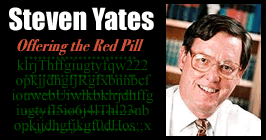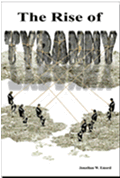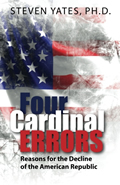"TAKING
THE RED PILL"
THE
REAL MATRIX,
PART 8
By Professor
Steven Yates
May 31, 2014
NewsWithViews.com
The Corporatist Matrix
[Author’s Note: my first publication here was a series called “The Real Matrix,” in seven parts. It came close to going viral. Within 12 hours I'd received over 100 emails, and in another 12 hours the number surpassed 200. I had to give up answering everyone, and now understood why writers sometimes fail to respond to readers' queries. The series won me speaking invitations and even a publication offer—although by then I was all-too-aware that the series, intended as a kind of swan song statement of what I’d learned, fell well short of its goal of comprehensiveness. Due to concerns over length I'd mistakenly removed a section on the British Fabian Society, for example.
This omission, among others, had prompted an email from one Terry Hayfield—which led to a lengthy correspondence. Hayfield’s research had convinced him that outside my “real matrix” was a specific British-American capitalism, managed by the Fabian Society for the British Crown. But weren’t the Fabians socialists? Yes, but this misses the point that in the “desert of the real” is not just a superelite but a process: a managed capitalism that would lead to socialism which would in turn issue in communism. In other words, communism is not “dead” because communism hasn't happened yet. The patriot who seeks to stop the global march towards communism finds that he must oppose British-American capitalism. At least some of Hayfield's research found its way into Four Cardinal Errors. Hayfield, meanwhile, found himself branded a closet Marxist by people who didn’t understand him. Some who did understand him found him threatening, or so I'd surmise from the fact that at least one website devoted to his work was shut down. As for myself, I finally decided we should work out terminology not dependent on the Marxian axis, terminology that might be unfamiliar at first but which if explained properly would leave no reasonably intelligent person confused.
My “Real Matrix” seems to hold up reasonably well once omissions are acknowledged, although unfortunately some of the links (e.g., the one to Agenda 21 on the UN website) no longer work. If the “Matrix” of the film was a dream world created by a malevolent artificial intelligence, the real matrix is the fantasy world created through a largely falsified history (designed to hide the Fabians and minimize the effects powerful banking interests have had on the world economy); a concatenation of bogus statistics about a “recovery” that doesn't exist outside Wall Street; public education designed to produce obedient debt-slaves; corporate (“mainstream”) media designed to tranquilize via myriad distractions (sports, celebrities, etc.); bread-and-circus elections every couple of years to fool the public into believing “democracy” is real and that they have choices over “their” country's prevailing policies.
Most Americans remain “plugged in” to this matrix, of course, a state of affairs encouraged by shills for the powerful such as Harvard law professor Cass Sunstein and shill publications such as Newsweek who wax eloquently about how dangerous “conspiracy theories” are. Think for a moment: how much of an idiot do you have to be to think wealthy and powerful people never go behind closed doors and devise policies that go against common people's best interests?
It is now just over nine years later. I'd begun writing an expanded version of “The Real Matrix,” one which filled gaps and contained things I’d learned more recently, from Hayfield as well as others. The manuscript eventually surmounted 200,000 words, and I doubted anyone would read a thing that size even if I could get it published. So that work fell quiet. Recently it occurred to me that given the worsening situation in Western civilization, there is absolutely no reason why the original series shouldn’t continue. There are several reasonably well-defined areas, after all, where the public is clearly being presented with fiction passed off as fact—often with lapses in basic logic that a (homeschooled) fifth grader would spot—or issues which are simply not reported at all. In 2008 I chanced to read a book that had been out a few years: Confessions of an Economic Hit Man, by John Perkins. That book confirmed something I’d begun to suspect, which is that the situation was at least a magnitude worse than even I had thought!]
“The Matrix is everywhere, it is all around us, even now in this very room. You can see it when you look out your window, or you turn on your television. You can feel it when you go to work, when you go to church, when you pay your taxes. It is the world that has been pulled over your eyes to blind you from the truth.”
“What truth?
“That you are a slave, Neo. Like everyone else, you were born into bondage... born into a prison that you cannot smell or taste or touch. A prison for your mind.” ~Morpheus and Neo, The Matrix
What is corporatism? The term is uncommon, so it demands explanation. It is not simply a permutation or corruption of capitalism. It is a system in its own right. I argue that it is the political economy of globalization.
Robert Locke, in a useful article, put it like this: “[Corporatism] has the outward form of capitalism in that it preserves private ownership and private management, but with a crucial difference: as under socialism, government guarantees the flow of material goods, which under true capitalism it does not. In classical capitalism, what has been called the 'night-watchman state,' government's role in the economy is simply to prevent force or fraud from disrupting the autonomous operation of the free market. The market is trusted to provide. Under corporatism, it is not, instead being systematically manipulated to deliver goods to political constituencies. This now includes basically everyone from the economic elite to ordinary consumers.”
A quote attributed to Benito Mussolini goes like this: “Fascism should more properly be called corporatism because it is the merger of state and corporate power.” There is no evidence Mussolini actually said this. It does not appear in his major writings. It is reasonably accurate except for one thing: fascism is openly dictatorial. Corporatism operates via incentives. Most people respond to incentives. Corporatism employs systems which, in Huxleyan fashion, lead most of the masses to embrace servitude. Those who don't can usually be marginalized and their views disregarded as 'outside the mainstream.'
Corporatism didn't emerge yesterday. It has a long history. It is often not recognized, because people confuse it with capitalism. They assume an economy is capitalistic simply because markets exist within it, so that voluntary selling and buying goes on, with profits being made. Markets existed in the Soviet Union—underground, of course. They are as old as humanity itself. There have always been underground markets in the U.S.: for illegal drugs, prostitutes, etc. The difference is one of degree, not kind. Some items marketed are beneficial (e.g., fresh vegetables). Others are not (e.g., cigarettes, sex slaves). While pundits can argue endlessly over whether “the people” ought to decide for themselves what they want to buy, legal systems circumscribe what is acceptable to sell and what is not acceptable to sell. In civilization, it has never been otherwise. Where markets are largely suppressed if not monopolized by government, one has “socialism.” Where they are allowed to flourish openly so that “capital” can be accrued on a fairly large scale, one has “capitalism.” If enterprises are chartered, subsidized, or their products made mandatory (think of Obamacare) or otherwise supported by governments, or if “capital” is used to buy governments on a large scale so that flows of goods and services can be directed alongside other policies, one has corporatism.
The British and Dutch chartered large corporations (British East Trading Company, Dutch East Trading Company) in the early 1600s. This partnership gave birth to modern corporatism. It allowed the colonization of other nations and the building of empires. Corporatism “worked” because those at the top of corporations got rich, as did those at the helm of governments.
During the ensuing two centuries, bankers honed the practice known as fractional reserve banking. Prior to this practice, currencies had been backed by precious metals, typically gold. Gold was the perfect choice because it was brightly colored, easily hammered into coins that could be denominated, and chemically inert. Its chemical inertness mirrored its relative political incorruptability. When currency was backed by gold, people advanced their economic interests through productive work. They did not get rich by creating money out of thin air. Fractional reserve banking changed all that, of course. The process has been explained many times; a good explanation along with its corrupting effects on a culture can be found here.
Adam Smith practically founded economics. The word capitalism hadn't been coined yet (much less corporatism). He argued in The Wealth of Nations (1776) that we should trust the “invisible hand of the marketplace” to increase our standard of living. By serving their own interests, businessmen would serve the interests of the whole whatever their intent. Adam Smith was not especially big business's friend, however. He held that businessmen, unless their activities were circumscribed by watchful public vigilance, including regulations where necessary, would conspire to raise prices. This aspect of his work is usually ignored. Of course, a “laissez-faire” system circumscribed within a regulatory web is a contradiction in terms. This suggests that such a thing has never existed. Not in civilization, anyway. It may have existed among primitive tribes, and on the various frontiers.
House of Rothschild interests spent decades worming their way into the U.S. economy. Their most significant 19th century effort, the Second Bank of the United States, was shut down by Andrew Jackson, who famously called its minions “a den of vipers and thieves.” Jackson survived an assassination attempt, by a man who admitted to working for “foreign interests.” Powerful people do not take kindly to being crossed up by politicians who refuse to be bought.
The Federal Reserve System corporatized the U.S. economy in 1913. Its designers had met in secret on Jekyll Island a few years before to plan it out—and to ensure that it would not be perceived as what it was: a central bank. Rothschild, JP Morgan, and Rockefeller interests were all represented. The corporatist “matrix” began to descend.
Also going into effect that year was the income tax. Prior to that time, direct, unapportioned taxes on one's personal income had been deemed unconstitutional by the Supreme Court (Pollock v. Farmers' Loan and Trust Co., 1895). All of a sudden, with the (questionable) passage of the Sixteenth Amendment, the income tax was constitutional. (Soon, “scholarly” rationalizations appeared about our “living, evolving document.”)
The average college student believes income taxes are necessary to fund essential functions of government. I once asked a group of students in one of my classes if they believed this. Most did. I then asked, “Did these functions exist prior to 1913?” “Yeah, I guess,” says one student. “In that case, with no income tax, how were they paid for?” Mostly stares of noncomprehension; a few visible light bulbs of sudden curiosity: I never thought of that before!
The extremely wealthy (e.g., Carnegies, Rockefellers, et al.) sunk enormous portions of their wealth into tax-exempt foundations. These were put to a variety of purposes, ranging from orchestrating a more warlike foreign policy to bankrolling studies in how to socially engineer a more compliant public. The Reece Commission's Norman Dodd revealed the Orwellian-named Carnegie Endowment for Peace's conclusions “in order to alter the life of an entire people” nothing was more effective than war, so that their question become, “How do we involve the U.S. in a war?” The U.S. entered what had been a European conflict. The result was the First World War, arguably a catastrophe for the entire Western world.
The public had to be induced to accept the new order in the making. Public schools were obvious venues for introducing controls. The Carnegie Endowment had said, “We must control education in the United States.” The Rockefeller Foundation bankrolled John Dewey, who gave the country “progressive education.” Public schools would never again be about conveying either a spirit of intellectual curiosity or genuine knowledge to children. They would be about “adjusting the child to a changing world,” i.e., control. These entities—tax-exempt foundations—also bankrolled studies of how advertising worked, how radio could be used, and when television appeared, how soap operas could be tailored to influence sexual mores. (Cf. B.K. Eakman's "The Cloning of the American Mind" for details.)
Economic elites also endowed major universities and supported “scholars” who would take subjects like history in desired directions. I documented this in an installment of the original series. The Rockefeller-endowed University of Chicago (from which John Dewey had been plucked) had separated academia into “disciplines” each of which would evolve its own neologisms, isolating them from one another and making it less likely they would compare notes. In particular, it was important to keep economics and politics separate, so as to thwart European-style “political economy.”
Economics as an isolated “discipline” could study “capitalism,” seeing market dynamics as law-governed phenomena operating independently of politics, culture, education, etc. This became a reigning dogma of neoclassical economics. Among the results was the Chicago School, led by Milton Friedman. Other disciplines could bash “capitalism” to their heart's content. This didn't matter. Very few academic lefties have ever been a serious threat to real power, as we will see in a future installment in this series. Studies in corporatism did not occur in academia, because by their very nature, they would have to be interdisciplinary—integrating political economy and history. With microspecialization now the rule, the term fell down the rabbit hole.
|
Meanwhile, the world had again descended into war. World War II was arguably many times more violent than its predecessor. Out of its predecessor had come the League of Nations, which the U.S. had refused to join. This basically killed its capacity to exercise influence, and for all practical purposes it was out of business by the end of the 1930s. Out of the aftermath of World War II came the United Nations, in 1945, and this time the U.S. took a lead role. “Satellite” entities were also created: e.g., the World Bank and the International Monetary Fund. The Bretton Woods system put in place in 1947 made the dollar the world's reserve currency, pegging it to gold at $35/oz., and other currencies were pegged to the dollar. This seemed the path to economic stability. So long as you did not live in a “developing” nation, this seemed true.
At the end of his presidency in 1961, Dwight D. Eisenhower would warn the world about the “military-industrial complex.” He barely scratched the surface. For ensuing decades saw not a path to stability but to increasing instability and slow, long-term destruction.
Coming Next: The Economic Development / Globalization Matrix.
Steven Yates has a doctorate in philosophy and currently lives in Santiago, Chile. He is the author of Four Cardinal Errors: Reasons for the Decline of the American Republic (Brush Fire Press International, 2011). He also owns an editing business, Final Draft Editing Service.
E-Mail: freeyourmindinsc@yahoo.com















 Share
This Article
Share
This Article






